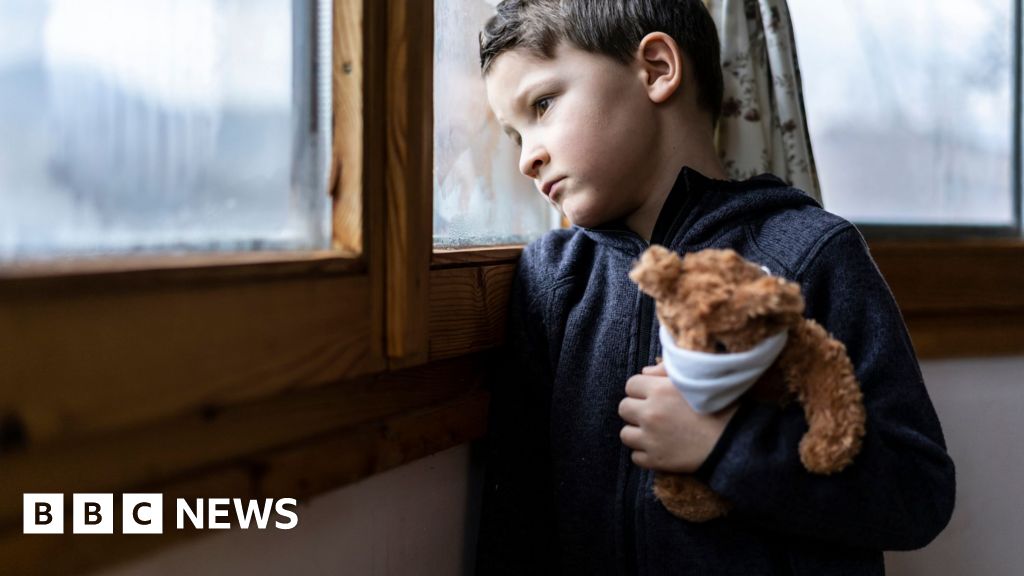Homelessness: Councils spent £1bn housing families in England

Councils in England spent a record £1bn on temporary accommodation for homeless families in the past year.
This is more than 50% higher than the year before, driven by record numbers of families living in short-term housing, including over 150,000 children.
Councils spent £417m accommodating families in hostels and bed and breakfasts, a 63% increase on the year before.
The Labour government, which came into power in July, says it will tackle the growing problem by banning no-fault evictions and building 1.5 million homes over the next five years.
Experts say soaring private rents, a lack of housebuilding and increased eviction rates have made homelessness a chronic problem.
Romel Peters, 37, has been stuck in temporary accommodation in London with her two young sons for over a year after being served a no-fault eviction by her private landlord.
The family all sleep in one room, while the “filthy” cooking and washing facilities are shared with other tenants.
“I can’t even describe how dirty the place is. I don’t cook here, my family cook and bring us food or I will cook at my mum’s house.
“I’ve gone into the kitchen to cook food and there have been cockroaches around the microwave,” she said.
She worries about the impact on her children, who have little space to play or do their homework, while most of their toys are in storage.
Romel had been on her local council’s housing list for almost a decade when she was evicted – only to be told she was no longer eligible because she had previously been renting privately.
“I’m devastated, I’ve been trying to contact the council for 18 months and no case worker has ever contacted me [back].
“I tried to find something myself and join housing associations, but they need a referral from the council and for weeks they got no reply.”
The council now want the family to move to temporary accommodation three hours away in West Bromwich.
As she doesn’t want to leave her family network or the children’s school behind, she refused – and the council says it no longer has a duty to help her. The family now face being homeless again as she cannot afford the increased cost of renting privately.
Latest figures from the Office for National Statistics show average rent increases across the UK ranged from 8.6% in England through to 8.2% in Scotland and 7.9% in Wales.
Northern Ireland’s data lags behind the rest of the UK, with figures currently available up to the end of last year. The ONS reported a 10% increase in the country for the year to May 2024.
High inflation – in part caused by the Covid pandemic and high energy prices after Russia invaded Ukraine – has kept rent prices high.
Polly Neate, chief executive of Shelter, said: “It’s absurd that we keep throwing good money after bad into grim homeless accommodation instead of investing in solutions that would help families into a safe and secure home.
“Decades of failure to build enough social homes combined with runaway rents and rising evictions has caused homelessness to spiral.
“Too many children are being forced to grow up homeless in grotty, cramped hostels and B&Bs, sharing beds with their siblings, with no place to play or do their homework.
“Rather than sinking billions into temporary solutions every year, the government must invest in genuinely affordable social homes and support councils so they can start building them.”
Shelter is calling on the government to build 90,000 social homes over the next decade.
They and other housing charities point out the real cost of homelessness to the public is even higher.
They say the figures, published by the Ministry of Housing, Communities and Local Government, show £2.3bn was spent paying for households in temporary accommodation once housing benefit, which is paid by the government, was included.
Housing is not just a problem in England – the devolved nations are equally under pressure.
In Scotland, the government has declared a national housing emergency. It is offering targeted funding of £2 million in 2023 to 2024 to the local authorities facing the most significant temporary accommodation pressures.
The latest data on spending on temporary accommodation in Wales has risen from £5.6m in 2018, to £42.9m in 2022 – a seven-fold increase – based on data from 20 out of 22 councils.
There are also problems in Northern Ireland – the country’s Housing Executive chief executive Grainia Long says there are 11,000 placements in temporary accommodation, compared to 3,000 before the Covid pandemic.
Related
Why investing in women is a vital next step for…
Get Nadine White's Race Report newsletter for a fresh perspective on the week's newsGet our free newsletter from The Independent's Race CorrespondentGet our fre
Business secretary signals major shift on electric car policy to…
In a determined effort to retain Nissan’s manufacturing presence in Britain, Business Secretary Jonathan Reynolds has vowed to implement “substantial c
Joint Statement: Business Secretary and Fujitsu Services Ltd
Business and Trade Secretary Jonathan Reynolds today (Friday 7 March) met chiefs for Fujitsu in Tokyo to begin talks over the cost of redress for victims of th
UK foreign secretary backs multilateral defence funding for Europe
UK foreign secretary David Lammy has said that a new multilateral fund will be needed to secure Europe’s defence as he confirmed that Britain is “open to”













